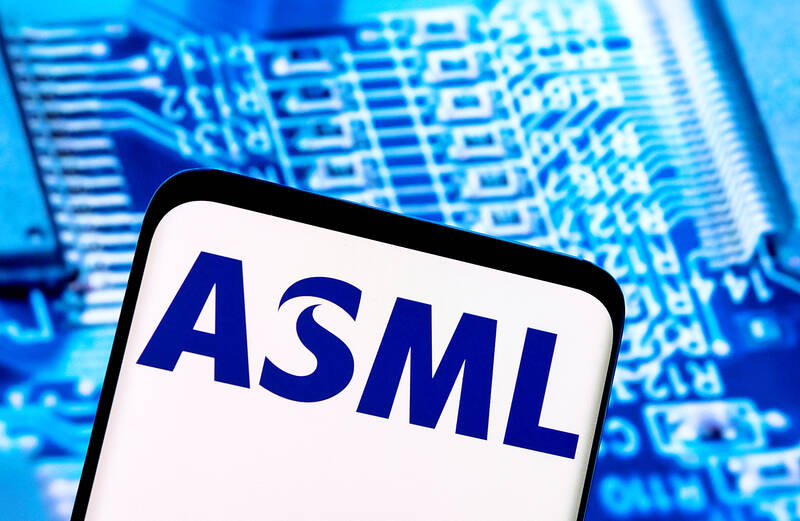Investors in chip stocks are facing a fresh gut check after a tepid outlook from key equipment supplier ASML Holding NV sparked a global rout in the sector.
Combined market value losses for an index of US-traded chipmakers plus the largest Asian stocks reached more than US$420 billion. Shares in ASML yesterday extended losses, falling 5 percent in Amsterdam, after plunging 16 percent the previous day.
The warning from Netherlands-based ASML halted a rally that had pushed a gauge of US-traded shares to a three-month high. Nvidia Corp sank nearly 5 percent on Tuesday in New York, after reaching a record close earlier this week on reduced concern over production issues with its newest artificial intelligence (AI) product.

Photo: Reuters
ASML’s shares on Tuesday tumbled by the most since 1998 after the manufacturer of the world’s most advanced chipmaking machines cut its outlook on sluggishness in areas beyond AI. It lowered the top end of its guidance range for next year’s total net sales to 35 billion euros (US$38.14 billion) from 40 billion euros.
While a weak forecast for next year was expected from ASML given slowness in non-AI applications as well as reduced spending by Intel Corp and other factors, “the magnitude of the correction is a negative surprise,” Citigroup Inc analyst Atif Malik wrote in a note.
Exacerbating the situation was the lack of accompanying color as the results were released mistakenly a day earlier than scheduled.
ASML published the release prematurely “due to a technical error,” it said in a statement.
The company was yesterday to hold a call with investors at 3pm in Amsterdam.
Tuesday’s collapse in the share price of ASML erased about 50 billion euros from the company’s market value. That places it among Europe’s five biggest single-day market capitalization wipeouts ever. It ranks alongside the plunges recorded by Nokia Oyj and Vodafone Group PLC when the Internet bubble burst some 25 years ago.
Losses in Asian trading yesterday were led by ASML peers including Tokyo Electron Ltd, which fell 9.2 percent, while Lasertec Corp, which makes equipment to inspect chips, lost 13.4 percent in Tokyo.
Shares of top foundry Taiwan Semiconductor Manufacturing Co (台積電), which is today to report third-quarter results, ended 2.34 percent lower in Taipei, while shares in Samsung Electronics Co and SK Hynix Inc closed down 2.46 percent and 2.18 percent respectively in Seoul.
Despite the market reaction, some investors see ASML’s woes as possibly specific to the Dutch company. AI demand remains brisk and Beijing’s efforts to revive its economy are seen helping a broader recovery.
“We believe chipmakers are strategically reducing orders for ASML, and this is negatively affecting ASML’s earnings,” Fibonacci Asset Management Global Pte chief executive officer Jung In-yun said.
Whether the driver is cost-cutting or other strategic reasons is unclear, he said, adding that stimulus from China might spur a rebound in chip demand.

United Microelectronics Corp (UMC, 聯電) expects its addressable market to grow by a low single-digit percentage this year, lower than the overall foundry industry’s 15 percent expansion and the global semiconductor industry’s 10 percent growth, the contract chipmaker said yesterday after reporting the worst profit in four-and-a-half years in the fourth quarter of last year. Growth would be fueled by demand for artificial intelligence (AI) servers, a moderate recovery in consumer electronics and an increase in semiconductor content, UMC said. “UMC’s goal is to outgrow our addressable market while maintaining our structural profitability,” UMC copresident Jason Wang (王石) told an online earnings

Gudeng Precision Industrial Co (家登精密), the sole extreme ultraviolet (EUV) pod supplier to Taiwan Semiconductor Manufacturing Co (TSMC, 台積電), is aiming to expand revenue to NT$10 billion (US$304.8 million) this year, as it expects the artificial intelligence (AI) boom to drive demand for wafer delivery pods and pods used in advanced packaging technology. That suggests the firm’s revenue could grow as much as 53 percent this year, after it posted a 28.91 percent increase to NT$6.55 billion last year, exceeding its 20 percent growth target. “We usually set an aggressive target internally to drive further growth. This year, our target is to

The TAIEX ended the Year of the Dragon yesterday up about 30 percent, led by contract chipmaker Taiwan Semiconductor Manufacturing Co (TSMC, 台積電). The benchmark index closed up 225.40 points, or 0.97 percent, at 23,525.41 on the last trading session of the Year of the Dragon before the Lunar New Year holiday ushers in the Year of the Snake. During the Year of the Dragon, the TAIEX rose 5,429.34 points, the highest ever, while the 30 percent increase in the year was the second-highest behind only a 30.84 percent gain in the Year of the Rat from Jan. 25, 2020, to Feb.

Cryptocurrencies gave a lukewarm reception to US President Donald Trump’s first policy moves on digital assets, notching small gains after he commissioned a report on regulation and a crypto reserve. Bitcoin has been broadly steady since Trump took office on Monday and was trading at about US$105,000 yesterday as some of the euphoria around a hoped-for revolution in cryptocurrency regulation ebbed. Smaller cryptocurrency ether has likewise had a fairly steady week, although was up 5 percent in the Asia day to US$3,420. Bitcoin had been one of the most spectacular “Trump trades” in financial markets, gaining 50 percent to break above US$100,000 and